Jesus heals the world over
When returning from a time such as we have, it is quite normal for people to ask if you ‘had a good time’. Many of you reading this, having been away yourselves, will know it can sometimes be difficult to give a clear response to those who ask ‘how did the trip go?’. Missionary trips can be emotionally and physically draining, subsequently, it might be sometime after returning before one can reflect on what God did in you as much as what He did through you. This report will try to focus on these perspectives as well as give an overall picture of what the team experienced in the prisons in Romania.
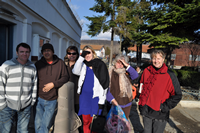 A good starting point might be to look at what comparisons could be drawn as to how ministry works across the two countries. One might say that on some levels it was very similar to the way in which Aspire works. Mobile phones were a definite ‘no no’, checking in was at the discretion of the guardhouse, inventive on-the-spot changes to planned services were commonplace, and the cover of prayer was essential to the spiritual life of the ministry. No differences there then!
A good starting point might be to look at what comparisons could be drawn as to how ministry works across the two countries. One might say that on some levels it was very similar to the way in which Aspire works. Mobile phones were a definite ‘no no’, checking in was at the discretion of the guardhouse, inventive on-the-spot changes to planned services were commonplace, and the cover of prayer was essential to the spiritual life of the ministry. No differences there then!
From what we experienced, security was very much the same, pat-down searches, passport and ID cheques at numerous places and we passed the body search machines from one area to another and of course the familiar guitar case search took place. However, we did experience a new aspect in the high security prison, in that we were passed by an armed guardsman, peering at us through his balaclava with his arms across his body holding his gun against his heavily protected torso. That was scary! Whilst this aspect seemed overwhelming, once in the prison compound the atmosphere resembled that of a category B prison in the UK. Another familiar sight greeted us as we crossed the yard of the young offenders prison, we were able to see the inmates peering through the bars of their cells and as they sat on their window ledges shouting down to us.
One marked difference, between the UK and Romanian prisons, is that there is not a ‘multi faith’ chaplaincy as such.1 For many years the Church, under the Ceausescu regime, was State controlled. In the transition to a democracy, the 1992 census reported that 86.8% of Romanians declared themselves as Roman Orthodox.2 The largest legally recognised faith in Romania is Eastern Orthodox and is thought to have begun with the apostle St Andrew, the “First-Called”, who preached in the region between the Danube and the west coast of the Black Sea.3 Today the State still maintains church finances and administration, for example, the State pays the salaries of priests and deacons, which would include priests working in prisons and there are still laws that prevent certain faiths from being practised without a license.
This common faith makes it much easier for Christian volunteers to go into the prisons. However, some consider that the structured tradition of the Orthodox Church hinders the potential of a personal relationship with Jesus. From this perspective the Romanian team expressed they have an uphill battle breaking into what might seem to be, a discipline of people having a ‘knowledge’ of God rather than having a ‘thirst’ for ‘knowing’ God as their personal saviour. On this basis, as it is for us in the UK, God can reach those who are in chains both physically and spiritually, through the living testimony of those who experience a freedom, only gained by the hope they have in Jesus.
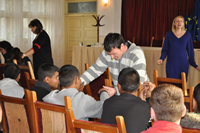 Unlike the UK, the prisoners did not have to elect to attend our meetings, they were brought on mass to them. It was our finding that, on the whole, inmates and guards alike were very much accepting of the worship and the ‘message’. On our first prison visit, following Daren’s powerful testimony, we felt God wanted to reach the prisoners on a more intimate level. We asked if it was OK to pray an individual blessing on each of the prisoners. This, not being the normal practice, had it’s risks, those who did not want to be prayed with were sensitively passed by but it was during these prayer times that many prisoners shed tears and expressed their anxieties to the our groups members.
Unlike the UK, the prisoners did not have to elect to attend our meetings, they were brought on mass to them. It was our finding that, on the whole, inmates and guards alike were very much accepting of the worship and the ‘message’. On our first prison visit, following Daren’s powerful testimony, we felt God wanted to reach the prisoners on a more intimate level. We asked if it was OK to pray an individual blessing on each of the prisoners. This, not being the normal practice, had it’s risks, those who did not want to be prayed with were sensitively passed by but it was during these prayer times that many prisoners shed tears and expressed their anxieties to the our groups members.
The visiting teams were encouraged by the response of the prisoners in being prayed with, and it was in the intimacy of simply blessing individuals, that God revealed his power of healing. As the UK team prayed with each individual, guards and prisoners alike, it seemed that the Spirit ministered to personal hurts and struggles. God revealed through us, a new approach for Ovi and Marius to operate in and God developed in us, especially in Sue, a boldness and assurance to being obedient to praying with people. We have heard that this openness to praying during the service has continued in our absence and in the Maximum Security prison, one inmate has started a prayer group! How amazing is that?
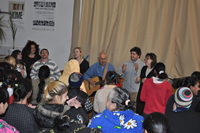 I have mentioned that worship was included in our visits and David played solidly for the whole of the week. His jazzy worship songs, were at first met with an air of confusion, as even in the liveliest Pentecostal churches, clapping, dancing and raising of hands is, most often, somewhat frowned on. So to see these strange visitors jigging about singing praise to God, initially caused a sense of amusement as it does in some of the UK prisons! God is bigger than culture and is capable of working through those who worship him in truth. As the services proceeded many began to clap, in no particular rhythm I might add, but with purpose and a sense of childlike joy that only comes from the Spirit. This observation only affirms, as we read in the bible, that music releases a blessing that allows people to worship through it. We saw God work through our worship to bless others. It reminded me of the times when Aspire has shared this joy in the UK prisons such as when services were held in the woman’s prison.
I have mentioned that worship was included in our visits and David played solidly for the whole of the week. His jazzy worship songs, were at first met with an air of confusion, as even in the liveliest Pentecostal churches, clapping, dancing and raising of hands is, most often, somewhat frowned on. So to see these strange visitors jigging about singing praise to God, initially caused a sense of amusement as it does in some of the UK prisons! God is bigger than culture and is capable of working through those who worship him in truth. As the services proceeded many began to clap, in no particular rhythm I might add, but with purpose and a sense of childlike joy that only comes from the Spirit. This observation only affirms, as we read in the bible, that music releases a blessing that allows people to worship through it. We saw God work through our worship to bless others. It reminded me of the times when Aspire has shared this joy in the UK prisons such as when services were held in the woman’s prison.
One of the areas that I find most challenging in the UK is the male young offenders prison. I often feel that I am looking at ‘children’ rather than young men and wonder what life circumstances have brought them into custody. The young offenders in Romania seemed even younger and childlike. One young man who had stolen from his mother’s purse and was serving a four year sentence, angrily challenged us by asking why his government felt it necessary to lock him up for such a petty theft, so that he was robbed of his youth. He wanted to know why God had allowed such a thing to happen. In this sensitive situation, Darren and Jo were able to respond by saying that he could, whilst in prison, still make a difference to his life by asking Jesus to help him deal with the consequences of his crime.
The ‘why question’ is as old as religion itself, maybe the best response could be that, “bad” things happen in the freedom that comes with the gift of choice and that God grieves and suffers with us in our efforts to be in His will and our journey to be more like Him.
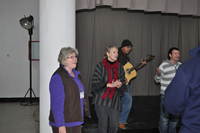 As a way of demonstrating our free choice, it was my role to give a talk about how a child in the womb, is perfectly and wonderfully made in God’s image and for His glory. I used a model that represented the size of a 12-week old baby in a mother’s womb to help demonstrate how perfect and unique we are. As the young men held this model in their hands, I told them that they were special and loved by God. Every time I do this activity, I am reminded, that often we can forget that the creator of the world knew each one of us as we were formed in our mother’s womb and that we are all made in His image. It is unfathomable to understand that God knows each and every child that is conceived and that whoever we see across the room, even across the globe, He sees in their potential and has a plan for them.
As a way of demonstrating our free choice, it was my role to give a talk about how a child in the womb, is perfectly and wonderfully made in God’s image and for His glory. I used a model that represented the size of a 12-week old baby in a mother’s womb to help demonstrate how perfect and unique we are. As the young men held this model in their hands, I told them that they were special and loved by God. Every time I do this activity, I am reminded, that often we can forget that the creator of the world knew each one of us as we were formed in our mother’s womb and that we are all made in His image. It is unfathomable to understand that God knows each and every child that is conceived and that whoever we see across the room, even across the globe, He sees in their potential and has a plan for them.
We prayed that the young men and woman we saw in prisons would grasp that they had, within their DNA, greater potential than they allowed themselves to explore. To this end, Darren has agreed to look at ways in which the ‘Teen Challenge’ organisation in Bucharest, can be introduced into some of the prisons we visited to help prevent the cycle of addiction and crime. Darren’s testimony is living proof that no matter what bad choices we make we can repent, receive restoration and live in relationship with God as priests in service to others.
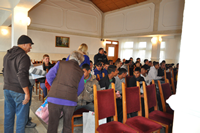 On a very practical level, the UK team were able to fund the giving of soap and toilet paper to each prisoner we met. Romanian prisons do not supply this as an essential item, so something as simple and as cheap as soap, can make a real difference to a person’s self esteem. It did seem somewhat ‘funny’, following a time of intimate prayer, to be giving out toilet paper along a line of outstretched hands, but hey, did not Jesus ask us to meet the needs of those around us. Even with the language barrier it was clear that the prisoners were thankful for this gift as they giggled and hid their toilet rolls up their jumpers!
On a very practical level, the UK team were able to fund the giving of soap and toilet paper to each prisoner we met. Romanian prisons do not supply this as an essential item, so something as simple and as cheap as soap, can make a real difference to a person’s self esteem. It did seem somewhat ‘funny’, following a time of intimate prayer, to be giving out toilet paper along a line of outstretched hands, but hey, did not Jesus ask us to meet the needs of those around us. Even with the language barrier it was clear that the prisoners were thankful for this gift as they giggled and hid their toilet rolls up their jumpers!
A message of hope
There are many stories to tell of our trip, but I guess the main thread to all of them, was seeing Jesus at work in and through Romanian teams as they, week in and week out, visited those in captivity.
When we were in a ‘house church’ meeting, we met an ex-offender who had become a Christian whilst in prison. This mother of four gave her testimony. She told us that three years ago she had struggled as she worked three jobs and how her unemployed husband drank her income away leaving little to feed their family. One of her jobs was to sell produce in a market and she had fixed her scales to take more money than was due. She was charged for stealing the equivalent to 80p over a number of transactions and received a one year prison sentence, leaving her oldest son of 12 to care for the family whilst she was in incarcerated.
She told us of how each day she had sat at her bedside asking God to protect her children. The ladies in the prison began to recognise that she was sure of Jesus’ love for her and they asked her to say prayers for them and their families. Her caring demeanour was also recognised by the staff at the prison and she was given the role of caring for the women when they needed first aid. She testified to how now outside of prison, God’s grace holds her family together as she continues to battle with her husband’s addictions.
Unlike the UK, the Romanian authorities allow prison visitors, such as volunteer groups, to continue to have a relationship with prisoners after release. This became a lifeline for this particular lady and her family. In addition to this, the prison in this ladies situation, allows her to go into the prison with Roxanna to witness to how God had changed her life, giving her hope and purpose rather than despair and deceit.
Often we find ourselves in seasons of life and in some cases God asks us to evaluate our journey and check that it is in line with His will. The trip to Romania affirmed many things in my mind. Firstly, God never wastes anything we do in His name. In fact I would say He is constantly preparing us for the next day or even the next moment to carry out His will in the most of simplest of things. I believe that sometimes we are only meant to be a passing service to others whilst at other times we are to be there for the long haul. While we were in Romania, David and I spent time with both couples to pray and talk to them about their ministries. They expressed how they had been encouraged and felt re-energised by what they had seen God do through us as individuals and as a team. From this perspective it would seem that all we have to do is obey God when he asks us to do something for Him, so that He can bless our obedience into the lives of others.
We saw many sad and upsetting situations in Romania, especially in the home for mentally ill children, but we also saw that God was at work in and through His people, healing in ways not always measured in human terms. If you feel God is asking you to spend a ‘season’ encouraging, helping, praying, praising or gifting finance to Romania, then just give us a call to see how you may become involved during the coming year.
We hope that you have found these insights of interest. We know that Jesus works through teams such as Aspire and we would encourage you to talk with your friends to see if they might want to join the team. Give them the web link to the Aspire site and encourage new seasons in people’s lives so that we can see what exciting things God will do through them.
(If you feel that we should be visiting or even revisiting any of your churches with our awareness services then please contact me or Clifford so that we can plan for 2012 also encourage people to pray for the work of Aspire, for the services, the offshoot projects and it’s future)
Blessings
David and Lynda West-Mullen
1 Population of 22,227,81- Christian: 94.00% Muslim: 0.70%
2Law and religion in post-communist Europe. Ferrari,Dunham and Sewell p242
By Silvio Ferrari, W. Cole Durham, Elizabeth A. Sewell
3http://www.oikoumene.org this site makes good reading if you want to explore more about the religious history etc
